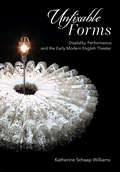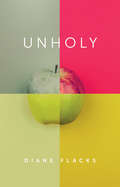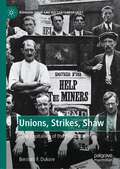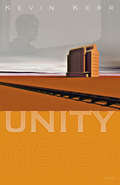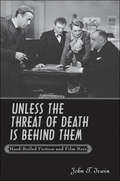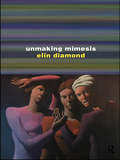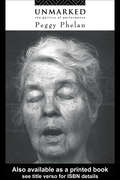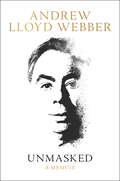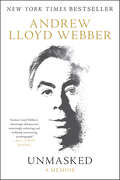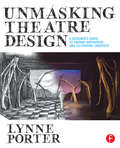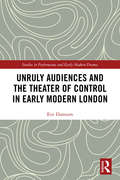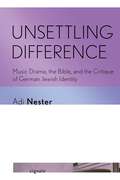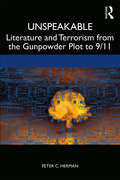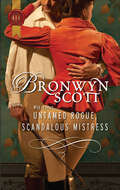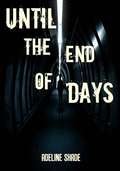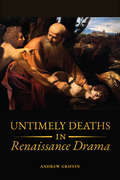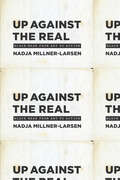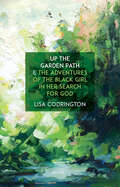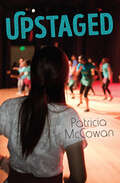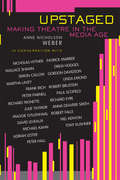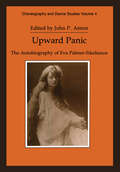- Table View
- List View
Unfixable Forms: Disability, Performance, and the Early Modern English Theater
by Katherine Schaap WilliamsUnfixable Forms explores how theatrical form remakes—and is in turn remade by—early modern disability. Figures described as "deformed," "lame," "crippled," "ugly," "sick," and "monstrous" crowd the stage in English drama of the sixteenth and seventeenth centuries. In each case, such a description distills cultural expectations about how a body should look and what a body should do—yet, crucially, demands the actor's embodied performance. In the early modern theater, concepts of disability collide with the deforming, vulnerable body of the actor. Reading dramatic texts alongside a diverse array of sources, ranging from physic manuals to philosophical essays to monster pamphlets, Katherine Schaap Williams excavates an archive of formal innovation to argue that disability is at the heart of the early modern theater's exploration of what it means to put the body of an actor on the stage. Offering new interpretations of canonical works by William Shakespeare, Ben Jonson, Thomas Dekker, Thomas Middleton, and William Rowley, and close readings of little-known plays such as The Fair Maid of the Exchange and A Larum For London, Williams demonstrates how disability cuts across foundational distinctions between nature and art, form and matter, and being and seeming. Situated at the intersections of early modern drama, disability studies, and performance theory, Unfixable Forms locates disability on the early modern stage as both a product of cultural constraints and a spark for performance's unsettling demands and electrifying eventfulness.
Unholy
by Diane FlacksShould women abandon religion? Four female panellists face off in a wild, whip-smart televised debate about the intersection of religion and misogyny. On one side, there’s Maryam, a progressive Muslim lawyer, and Yehudit, an Orthodox Jewish spiritual leader. The other has Liz, a lesbian antitheist pundit, and Margaret, an excommunicated nun. The debaters wrestle with themselves and with each other: Can you be a feminist and believe in religion? What can or can’t be forgiven? Why do we have faith to begin with? Between the arguments, each of the debaters return to a seminal and secret moment in their past that represents a crisis of faith, leading the debate to become more and more personally charged, until it climaxes in an epic battle. Unholy delves into the biblical struggles that tear us apart and make us who we are. It’s about having the courage to take the leap in life and into love. What is more holy than that?
Unions, Strikes, Shaw: "The Capitalism of the Proletariat" (Bernard Shaw and His Contemporaries)
by Bernard F. DukoreUnions, Strikes, Shaw: ‘The Capitalism of the Proletariat’ is the first book to treat Bernard Shaw—socialist, dramatist, public speaker and union member—in relation to unions and strikes. For over half a century he urged workers to join unions, which he called, paradoxically, “the Capitalism of the Proletariat,” because as capitalists try to get as much labor as possible from workers while paying them as little as possible, unions try to gain as high wages as possible from employers while working as little as possible. He opposed general strikes as destined to fail, since owners can hold out longer than workers, whose unions have less money to support them during strikes. This book offers background on major strikes in and before Shaw’s time —including the Colorado Coalfield War and the Dublin Lockout, both in 1913—before analyzing the causes, day-by-day events and consequences of Britain’s 1926 General Strike. It begins and ends with examinations of their and Shaw’s relevance to actions on unions and strikes in our own time.
Unity
by Kevin KerrIn the fall of 1918, a world ravaged by war was suddenly hit by a mysterious and deadly plague. As fear of the dreaded "Spanish" flu fills the town of Unity with paranoia, drastic measures are taken. But when the disease descends upon the town despite their precautions, the citizens begin to turn on each other, looking for a scapegoat.
Unless the Threat of Death Is Behind Them: Hard-Boiled Fiction and Film Noir
by John T. IrwinEarly in the twentieth century a new character type emerged in the crime novels of American writers such as Dashiell Hammett and Raymond Chandler: the "hard-boiled" detective, most famously exemplified by Sam Spade in The Maltese Falcon. Unlike the analytical detectives of nineteenth-century fiction, such as Edgar Allan Poe’s Inspector Dupin, the new detectives encountered cases not as intricate logical puzzles but as stark challenges of manhood. In the stories of these characters and their criminal opposites, John T. Irwin explores the tension within ideas of American masculinity between subordination and independence and, for the man who becomes "his own boss," the conflict between professional codes and personal desires. He shows how, within different works of hard-boiled fiction, the professional either overcomes the personal or is overcome by it, ending in ruinous relationships or in solitary integrity, and how within the genre all notions of manly independence are ultimately revealed to be illusions subordinate to fate itself. Tracing the stylistic development of the genre, Irwin demonstrates the particular influence of the novel of manners, especially the writing of F. Scott Fitzgerald. He goes on to argue that, from the time of World War II, when hard-boiled fiction began to appear on the screen in film noir just as women entered the workforce in large numbers, many of its themes came to extend to female empowerment. Finally, he discusses how these themes persist in contemporary dramatic series on television, representing the conflicted lives of Americans into the twenty-first century.
Unmaking Mimesis: Essays on Feminism and Theatre
by Elin DiamondIn Unmaking Mimesis Elin Diamond interrogates the concept of mimesis in relation to feminism, theatre and performance. She combines psychoanalytic, semiotic and materialist strategies with readings of selected plays by writers as diverse as Ibsen, Brecht, Aphra Behn, Caryl Churchill and Peggy Shaw. Through a series of provocative readings of theatre, theory and feminist performance she demonstrates the continuing force of feminism and mimesis in critical thinking today. Unmaking Mimesis will interest theatre scholars and performance and cultural theorists, for all of whom issues of text, representation and embodiment are of compelling concern.
Unmarked: The Politics of Performance
by Peggy PhelanUnmarked is a controversial analysis of the fraught relation between political and representational visibility in contemporary culture. Written from and for the Left, Unmarked rethinks the claims of visibility politics through a feminist psychoanalytic examination of specific performance texts - including photography, painting, film, theatre and anti-abortion demonstrations.
Unmarked: The Politics of Performance
by Peggy PhelanUnmarked is a controversial analysis of the fraught relation between political and representational visibility in contemporary culture. Written from and for the Left, Unmarked rethinks the claims of visibility politics through a feminist psychoanalytic examination of specific performance texts - including photography, painting, film, theatre and anti-abortion demonstrations.
Unmasked: A Memoir
by Andrew Lloyd WebberNew York Times Bestseller: From the Broadway legend, a “charmingly idiosyncratic, surprisingly endearing and ruthlessly entertaining autobiography” (The Wall Street Journal).Andrew Lloyd Webber has reigned over the musical theatre world for half a century. Here, in his own inimitable, quirky voice, the revered composer takes stock of his achievements, the twists of fate that brought both success and disappointment, and what inspires and sustains him. He reveals his artistic influences and reminisces about his bohemian London youth and the happiest place of his childhood: his homemade Harrington Pavilion—a make-believe world of musical theatre in which he created his earliest entertainments.A record of several exciting and turbulent decades of British and American musical theatre, Unmasked is ultimately a chronicle of artistic creation. Lloyd Webber looks back at the development of some of his most famous works and his collaborations with such luminaries as Tim Rice, Robert Stigwood, Harold Prince, Cameron Mackintosh, and Trevor Nunn. He reveals fascinating details about each of his productions: the cast of characters involved with making them, the creative and logistical challenges, and the artistic political battles.He recalls writing songs for a school production that would become his first hit, Joseph and the Amazing Technicolor Dreamcoat; finding the performers for his rock opera Jesus Christ Superstar; developing his first megahit, Evita, which would win seven Tony Awards; staking his reputation and fortune on the groundbreaking Cats; and making history with the dazzling The Phantom of the Opera.Reflecting a life of many passions (from architecture to Turkish Swimming Cats), full of witty and revealing anecdotes, and featuring cameos by many celebrities—Elaine Paige, Sarah Brightman, David Frost, Julie Covington, Judi Dench, Richard Branson, A.R. Rahman, Mandy Patinkin, Patti LuPone, Richard Rodgers, Norman Jewison, Milos Forman, Plácido Domingo, Barbra Streisand, Michael Crawford, Gillian Lynne, Betty Buckley, and more—Unmasked at last reveals the true face of the extraordinary man behind the legend.
Unmasked: A Memoir
by Andrew Lloyd Webber“Unmasked will tickle music and theater geeks. It’s an insider’s inside account, highly readable, thanks to Lloyd Webber’s affable, intelligent voice.” —USA TodayOne of the most successful and distinguished artists of our time, Andrew Lloyd Webber has reigned over the musical theatre world for nearly five decades. The winner of numerous awards, including multiple Tonys and an Oscar, Lloyd Webber has enchanted millions worldwide with his music and numerous hit shows, including Jesus Christ Superstar, Evita, Cats, The Phantom of the Opera—Broadway’s longest running show—and most recently, School of Rock. In Unmasked, written in his own inimitable, quirky voice, the revered, award-winning composer takes stock of his achievements, the twists of fate and circumstance which brought him both success and disappointment, and the passions that inspire and sustain him.A record of several exciting and turbulent decades of British and American musical theatre and the transformation of popular music itself, Unmasked is ultimately a chronicle of artistic creation. Lloyd Webber looks back at the development of some of his most famous works and illuminates his collaborations with luminaries such as Tim Rice, Robert Stigwood, Harold Prince, Cameron Mackintosh, and Trevor Nunn.Reflecting a life that included many passions (from architecture to Turkish Swimming Cats), full of witty and revealing anecdotes, and featuring cameo appearances by numerous celebrities—Elaine Paige, Sarah Brightman, David Frost, Julie Covington, Judi Dench, Richard Branson, A.R. Rahman, Mandy Patinkin, Patti LuPone, Richard Rodgers, Norman Jewison, Milos Forman, Plácido Domingo, Barbra Streisand, Michael Crawford, Gillian Lynne, Betty Buckley, and more—Unmasked at last reveals the true face of the extraordinary man beneath the storied legend.
Unmasking Theatre Design: A Designer's Guide To Finding Inspiration And Cultivating Creativity
by Lynne PorterEvery great design has its beginnings in a great idea, whether your medium of choice is scenery, costume, lighting, sound, or projections. Unmasking Theatre Design shows you how to cultivate creative thinking skills through every step of theatre design - from the first play reading to the finished design presentation. This book reveals how creative designers think in order to create unique and appropriate works for individual productions, and will teach you how to comprehend the nature of the design task at hand, gather inspiration, generate potential ideas for a new design, and develop a finished look through renderings and models. The exercises presented in this book demystify the design process by providing you with specific actions that will help you get on track toward fully-formed designs. Revealing the inner workings of the design process, both theoretically and practically, Unmasking Theatre Design will jumpstart the creative processes of designers at all levels, from student to professionals, as you construct new production designs.
Unmasking What Matters: 10 Life Lessons From 10 Years on Broadway
by Sandra Joseph#1 International Best Seller Living a meaningful, satisfying life is an enigma for most people today. We feel stuck, small, without the self-confidence to move in the direction of what we really want. Or, if we do muscle through our fear in pursuit of our dreams, we exhaust ourselves working and striving and achieving and yet somehow, no matter our level of outer-world success, are left dazed and disheartened, asking ourselves, “Is this all there is?” After ten years on Broadway, Sandra Joseph—the longest-running leading lady in Broadway’s longest-running show, The Phantom of the Opera—knows one thing for sure: the only way to have a truly fulfilling life and achieve success that satisfies is to recognize that the journey up is no substitute for the journey in. In Unmasking What Matters, Joseph uses lessons learned on the road to Broadway, during her decade as Christine, and through the challenges she faced after walking away from the business to show readers how to courageously bring their inner voice to the outer world, stop seeking success for achievement’s sake and start creating the life they truly desire. With her hard-won wisdom, poignant personal stories, and practical, experiential exercises to guide them, readers will learn to shed their limiting masks, mindfully work through their fears, stand in their authentic power, and build a life rich with satisfaction, meaning, and significance. Warm, humble, encouraging, and inspiring, Unmasking What Matters can help anyone move from stuck, fearful, and playing it safe to embracing their passions, gifts, and opportunities and living life “full-out” today.
Unruly Audiences and the Theater of Control in Early Modern London: Controlling the Unruly Playgoer in Early Modern Drama (Studies in Performance and Early Modern Drama)
by Eric DunnumUnruly Audiences and the Theater of Control in Early Modern London explores the effects of audience riots on the dramaturgy of early modern playwrights, arguing that playwrights from Marlowe to Brome often used their plays to control the physical reactions of their audience. This study analyses how, out of anxiety that unruly audiences would destroy the nascent industry of professional drama in England, playwrights sought to limit the effect that their plays could have on the audience. They tried to construct playgoing through their drama in the hopes of creating a less-reactive, more pensive, and controlled playgoer. The result was the radical experimentation in dramaturgy that, in part, defines Renaissance drama. Written for scholars of Early Modern and Renaissance Drama and Theatre, Theatre History, and Early Modern and Renaissance History, this book calls for a new focus on the local economic concerns of the theatre companies as a way to understand the motivation behind the drama of early modern London.
Unsettling Difference: Music Drama, the Bible, and the Critique of German Jewish Identity (Signale: Modern German Letters, Cultures, and Thought)
by Adi NesterUnsettling Difference challenges the major-minor pattern that has framed discussions of German Jewish difference, focusing on instances that fall outside traditional understandings of minority culture. Exploring expressions of Jewish identity and difference in biblical-themed musical dramas and their literary sources, Adi Nester argues that the issue of Jewish difference should be treated as an aesthetic question in the first half of the twentieth century, even amid the rise of pseudoscientific theories about race and blood.Drawing on the fraught, parallel histories of opera and the modern reception of the Hebrew Bible in Germany, both significant in debates at the time about the nature of Jewish separateness, Unsettling Difference shows how this discourse troubles concepts of Jewish marginality and (non-Jewish) German dominance. Through innovative readings of key works in this tradition—Rudolf Borchardt's poem, Das Buch Joram; Paul Ben-Haim's oratorio, Joram; Arnold Schoenberg's opera, Moses und Aron; Joseph Roth's novel, Hiob; and Eric Zeisl's opera, Hiob—Nester shows how these biblical adaptations foreground alternative notions of difference that rely on confusion, ambiguity, radical heterogeneity, excess, and repetition.
Unspeakable: Literature and Terrorism from the Gunpowder Plot to 9/11
by Peter C. HermanUnspeakable: Literature and Terrorism from the Gunpowder Plot to 9/11 explores the representation of terrorism in plays, novels, and films across the centuries. Time and time again, writers and filmmakers including William Shakespeare, Joseph Conrad, Henry James, Gillo Pontecorvo, Don DeLillo, John Updike, and Steven Spielberg refer to terrorist acts as beyond comprehension, “a deed without a name,” but they do not stop there. Instead of creating works that respond to terrorism by providing comforting narratives reassuring audiences and readers of their moral superiority and the perfidy of the terrorists, these writers and filmmakers confront the unspeakable by attempting to see the world from the terrorist’s perspective and by examining the roots of terrorist violence.
Untamed Rogue, Scandalous Mistress
by Bronwyn ScottSelf-made miss Aurora Calhoun has always possessed an uncommon amount of sense when it comes to men. However, within minutes of colliding with Lord Ramsden's carriage, she finds herself kissing the incorrigible rogue!Crispin Ramsden feels restrained by the shackles of his unwanted inheritance. Especially when he is faced with a woman whose impetuous nature ignites a passion that is as uncontrollable as it is scandalous! Society is rocked by this outrageous couple. Can these two wild hearts find a place to belong?
Until the End of Days
by Elaine Cristina Albino de Oliveira Adeline ShadeThe world is slowlydying. The streets are not safe, for one's attempt to scavenge for food may be someone else's bountiful hunt. Meanwhile, a mother and daughter struggle to survive the hunger and the violence.
Untimely Deaths in Renaissance Drama
by Andrew GriffinIn the decades before history was institutionalized as a scholarly discipline, historical writing was practiced variously by poets, record keepers, lawyers, sermonizers, mythologizers, and philosophers. In this welter of competing forms of historical thought, early modern drama often operated as a site in which claims about the nature of historical change could be treated in a frequently conflicting manner. To explore this arena of competing forms of historical explanation, Untimely Deaths in Renaissance Drama focuses on the problem of narrative abruption in a selection of historically minded early modern plays as they rely on various strategies to make sense of biography and fatality. Arguing that narrative forms fail in the face of untimely death, Andrew Griffin shows that the disruption appears as a matter of trauma, making the untimely death both a point of narrative conflict and a social problem. Exploring the formula that early modern dramatists used to make sense of life and death, this book draws on the wider context of this period’s culture of historical writing.
Up Against the Real: Black Mask from Art to Action
by Nadja Millner-LarsenA history of 1960s activist art group Black Mask. With Up Against the Real, Nadja Millner-Larsen offers the first comprehensive study of the group Black Mask and its acrimonious relationship to the New York art world of the 1960s. Cited as pioneers of now-common protest aesthetics, the group’s members employed incendiary modes of direct action against racism, colonialism, and the museum system. They shut down the Museum of Modern Art, fired blanks during a poetry reading, stormed the Pentagon in an antiwar protest, sprayed cow’s blood at the secretary of state, and dumped garbage into the fountain at Lincoln Center. Black Mask published a Dadaist broadside until 1968, when it changed its name to Up Against the Wall Motherfucker (after line in a poem by Amiri Baraka) and came to classify itself as “a street gang with analysis.” American activist Abbie Hoffman described the group as “the middle-class nightmare . . . an anti-media phenomenon simply because their name could not be printed.” Up Against the Real examines how and why the group ultimately rejected art in favor of what its members deemed “real” political action. Exploring this notorious example of cultural activism that rose from the ruins of the avant-garde, Millner-Larsen makes a critical intervention in our understanding of political art.
Up Against the Real: Black Mask from Art to Action
by Nadja Millner-LarsenA history of 1960s activist art group Black Mask. With Up Against the Real, Nadja Millner-Larsen offers the first comprehensive study of the group Black Mask and its acrimonious relationship to the New York art world of the 1960s. Cited as pioneers of now-common protest aesthetics, the group’s members employed incendiary modes of direct action against racism, colonialism, and the museum system. They shut down the Museum of Modern Art, fired blanks during a poetry reading, stormed the Pentagon in an antiwar protest, sprayed cow’s blood at the secretary of state, and dumped garbage into the fountain at Lincoln Center. Black Mask published a Dadaist broadside until 1968, when it changed its name to Up Against the Wall Motherfucker (after line in a poem by Amiri Baraka) and came to classify itself as “a street gang with analysis.” American activist Abbie Hoffman described the group as “the middle-class nightmare . . . an anti-media phenomenon simply because their name could not be printed.” Up Against the Real examines how and why the group ultimately rejected art in favor of what its members deemed “real” political action. Exploring this notorious example of cultural activism that rose from the ruins of the avant-garde, Millner-Larsen makes a critical intervention in our understanding of political art.
Up Against the Real: Black Mask from Art to Action (Mersion: Emergent Village Resources For Communities Of Faith Ser.)
by Nadja Millner-LarsenA history of 1960s activist art group Black Mask. With Up Against the Real, Nadja Millner-Larsen offers the first comprehensive study of the group Black Mask and its acrimonious relationship to the New York art world of the 1960s. Cited as pioneers of now-common protest aesthetics, the group’s members employed incendiary modes of direct action against racism, colonialism, and the museum system. They shut down the Museum of Modern Art, fired blanks during a poetry reading, stormed the Pentagon in an antiwar protest, sprayed cow’s blood at the secretary of state, and dumped garbage into the fountain at Lincoln Center. Black Mask published a Dadaist broadside until 1968, when it changed its name to Up Against the Wall Motherfucker (after line in a poem by Amiri Baraka) and came to classify itself as “a street gang with analysis.” American activist Abbie Hoffman described the group as “the middle-class nightmare . . . an anti-media phenomenon simply because their name could not be printed.” Up Against the Real examines how and why the group ultimately rejected art in favor of what its members deemed “real” political action. Exploring this notorious example of cultural activism that rose from the ruins of the avant-garde, Millner-Larsen makes a critical intervention in our understanding of political art.
Up the Garden Path & The Adventures of the Black Girl in Her Search for God
by Lisa CodringtonIn Up the Garden Path, Rosa, a young Barbadian seamstress, offers to pose as her brother to go to the Niagara Region in Ontario to work. There, she meets an aspiring actress obsessed with Joan of Arc, the ghost of a black Loyalist soldier who wants to die and a boss who can’t keep the starlings away from his failing vineyard. Finding it impossible to ignore their demands, but not wanting to be found out and sent home, Rosa has to stop and figure out what she really wants instead of what everyone around her needs. Based on Bernard Shaw’s short story, The Adventures of the Black Girl in Her Search for God follows a black girl who is abandoned by a white missionary for asking too many questions. Taking matters into her own hands, the Black Girl sets off to find out who or what God really is. Along the way she meets a number of characters who have very different views on God, but the Black Girl’s unrelenting questions create conflict, and in the end she’s forced to make her own decisions on God and her search.
Upstaged (Orca Limelights)
by Patricia McCowanEllie is used to getting leading roles in her small-town school’s musicals, but her place at center stage disappears when her dad becomes the host of a breakfast TV show and they have to move to the big city. When Ellie auditions for—and lands—a spot with the Youth Works Theater Company, she comes up against a tight-knit group of talented, experienced and competitive triple-threat performers. Not only does she not get a lead, but she has to share a role with Marissa, a company veteran who seems determined to do all she can to outshine Ellie. Out of her depth and far from all that she’s known, Ellie wonders just what she has to do to stop feeling upstaged by everyone around her. This short novel is a high-interest, low-reading level book for middle-grade readers who are building reading skills, want a quick read or say they don’t like to read! The epub edition of this title is fully accessible.
Upstaged: Making Theatre in a Media Age
by Anne Nicholson WeberHow can theatre thrive in a culture dominated by film and television? Interviews with stage actors, playwrights, theatre directors and others, including Julie Taymor, Tony Kushner, Anna Deavere Smith, Peter Hall, Wallace Shawn, Frank Rich, Simon Callow, Maggie Gyllenhaal, David Leveaux, Adrian Lester, Nicholas Hytner, Paul Scofield and Robert Brustein. Ever since the introduction of the talkies in the '20s and television in the '50s, live theatre has struggled for its place in a culture increasingly dominated by the screen. How does that dominance affect individual theatre artists and theatrical movements? How does it change what audiences seek from the theatre? What, in the end, is the role of live theatre in our media-saturated culture? Anne Nicholson Weber has sought answers from an extraordinary cast of leading actors, playwrights, directors, producers, critics, agents and marketers. In conversations that range from close-ups to cultural imperialism, microphones to myth-making, sit-coms to Shakespeare and vocal technique to voyeurism, these thoughtful observers illuminate the struggle of making a living versus making art; the modern audience's preference for images over words and for technology over the human body; and the imperative that theatre play to its essential strengths of language, metaphor, immediacy and community. Those who love theatre will find wisdom and support in this fascinating book.
Upward Panic: The Autobiography of Eva Palmer-Sikelianos (Choreography and Dance Studies Series #Vol. 4.)
by John P. AntonFirst Published in 1993.A complete autobiography of Evalina Palmer-Sikelianos (1874-1952), a woman of immense spiritual strength who fought for the arts against the background of war. She contributed impressively throughout her life to the revival of interest in classical Greece, the theatre and choral dance, and advocated an adherence to mythical authenticity rather than a romanticised view of Greek tragic drama.
